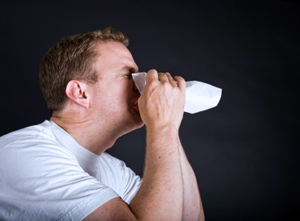How to Train With a Cold or Illness
 The energy required to maintain consistent and progressive training habits is a constant demand. However, it becomes a whole new battle when an illness gets thrown in to the mix. The main problem, aside from the symptoms, is that athletes typically respond to an illness with a sudden halt from exercise, usually to rest and recuperate.
The energy required to maintain consistent and progressive training habits is a constant demand. However, it becomes a whole new battle when an illness gets thrown in to the mix. The main problem, aside from the symptoms, is that athletes typically respond to an illness with a sudden halt from exercise, usually to rest and recuperate.
Although rest is extremely important for athletes, especially those who are sick, abstaining from all physical activity is not the best recourse for a speedy recovery. In fact, exercise helps keep your body’s immune system functioning at a high level. So what is the balance between rest and exercise while an athlete is under the weather? This guide provides some insight into that very dilemma.
Act Promptly
If you begin to feel symptoms of a cold, don’t just sit back and let it take over your body — the quicker you begin treatment, the easier and faster you'll recover. Recognize your symptoms and investigate them online or with a doctor. Is it the seasonal cold that everyone seems to be coming down with? Is it something unique and possibly more serious? Research and act on these symptoms to prevent the illness from escalating.
Increase the Vitamins, Increase the Calories
Fighting off a cold takes work, which is why fatigue is such a common symptom. Your immune system is battling a disease, and that takes energy; energy, in turm, comes from consuming calories. Now’s not the time to think about calorie restriction: You have to eat to get better. Make sure what you’re eating is beneficial to improving your health. Foods that are vitamin and nutrient-packed, such as fruits and vegetables, are among the best you can eat.
Also, juice is commonly thought to be a great source of the much-needed vitamins, but that only holds true to juice that’s been fresh-squeezed, without any sugar or preservatives added. Processed sugar in juice that's not 100 percent pure evokes an insulin spike, which in turn increases inflammation. To speed up your recovery as much as possible, it’s important to eat low-glycemic foods (foods with low starch and sugar levels). Sugar should only be consumed in its natural state, such as inside fruit.
Vitamin C is the Key to Recovery
| Foods Rich in Vitamin C |
| Fruits: Guava, lemons, Kiwi, Peaches, Strawberries, Oranges, Raspberries, Mangoes |
| Vegetables: Broccoli, Kale, Bell Peppers, Cauliflower, Brussel Sprouts, Parsley |
Vitamin C is generally found in fruits and vegetables. It's a primary nutrient that is great for boosting the immune system. Taking a multi-vitamin is another great way to obtain many nutrients that will help you get better. However, don’t let a supplement exclude you from consuming healthy foods, as well.
Taking a multi-vitamin and eating immune system-boosting food (like fruits and vegetables) is the best way to speed up your recovery. Keep in mind that some nutrients are exclusive to just vegetables—as some are to fruits—so be sure to stick with a wide variety of both.
Remain Active
Whether you are ill or not, sleep is essential for increasing performance. Sleep is important for reducing fatigue and improving concentration, which carries over into an increased energy-output, reaction time, and overall performance level. Athletes deprived of sleep have been proven to process and store glucose (energy) at a reduced efficiency.
Don’t let a cold bring your athletic performance down to zero. The worst thing an athlete can do is stop moving. Granted, your fatigue might be a bit higher than usual, which means pursuing personal bests in training might be set on hold until you’ve recuperated, but continuing to stay active (through any discourse) will improve your recuperation.
Complete your exercise at a slightly-reduced intensity or try to produce the same intensity level, but under a reduced duration. If an illness has really wiped you out, simply take some time to stretch and/or walk. It’s remarkable how much better someone feels after they exercise, even if it’s simply a low-key activity to evoke some increased blood-flow.
Monitor Your Progress
While you’re ill, keep track of your recovery. Do you feel better each day? Are symptoms getting worse? Assess the progress you’ve made to get better. If you aren’t making any improvements, reevaluate your exercise and nutrition routines. You might need to increase your vitamin intake, or maybe grab an extra hour or two of sleep. Constantly assess and reassess your progress while on the road to recovery. Make sure you are always headed in the right direction.
Don’t Let the Common Cold Bring You Down
Combating an illness while maintaining an active training schedule and proactive diet is a difficult task, but it is essential for maintaining your current performance levels. Don’t let a sudden illness force you to halt your training. Approach your illness with a strategy and be prepared to change it at any time (if needed). Remember that although sleep is important for a speedy recovery, it’s also important to keep the body active and properly fueled so it continues to function at an efficient state.
